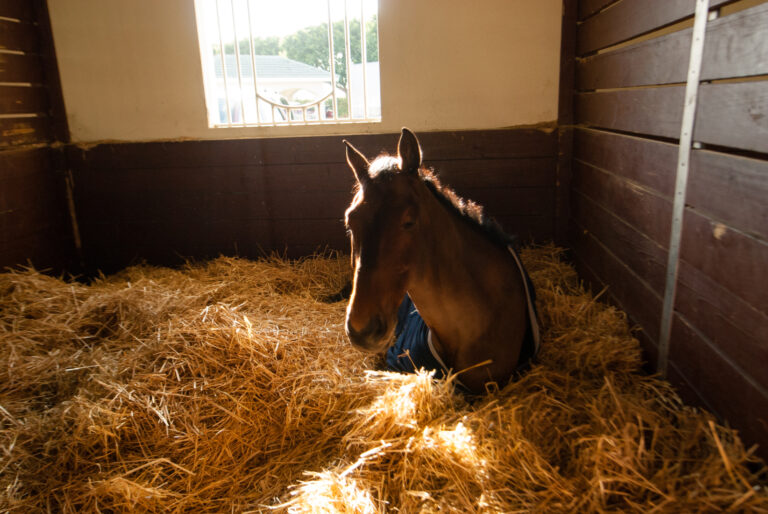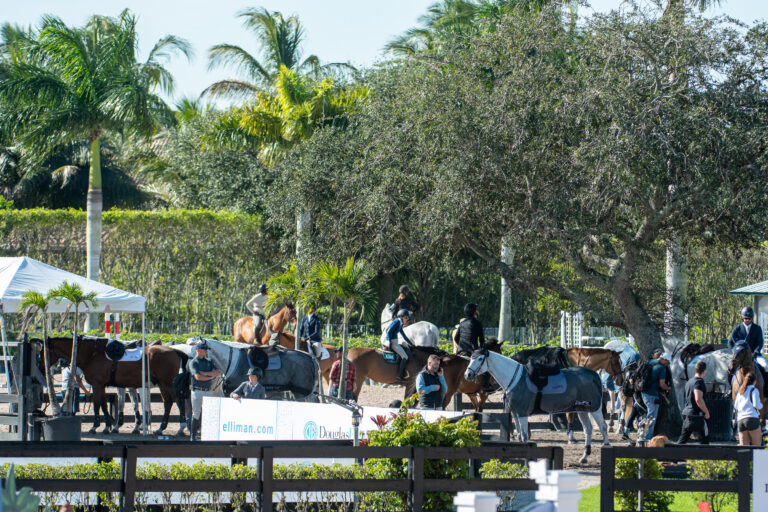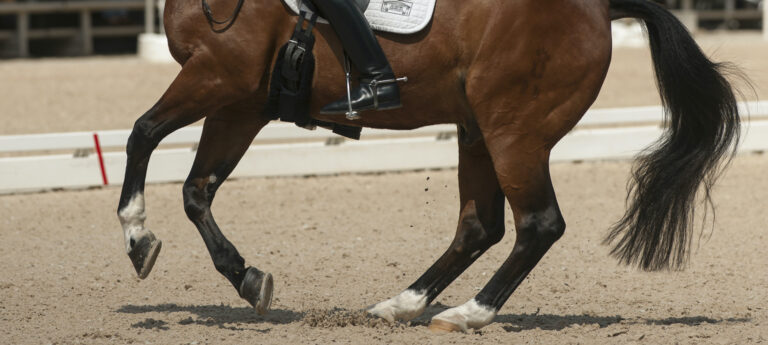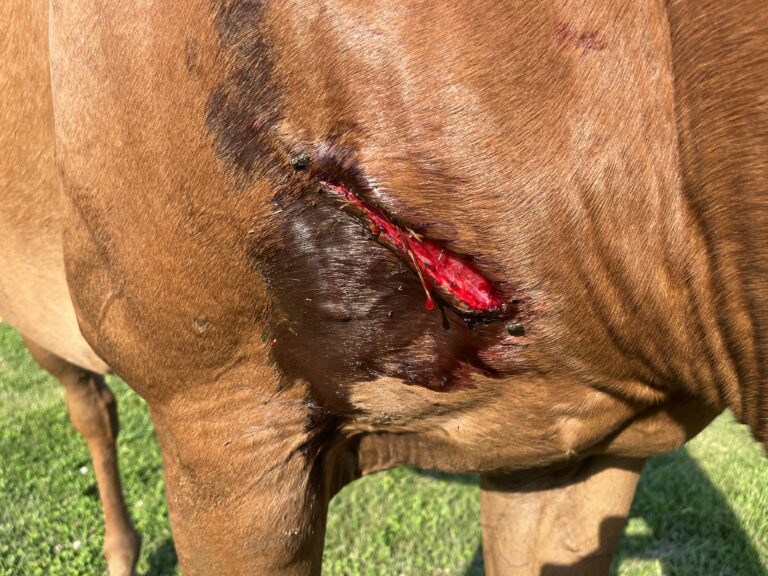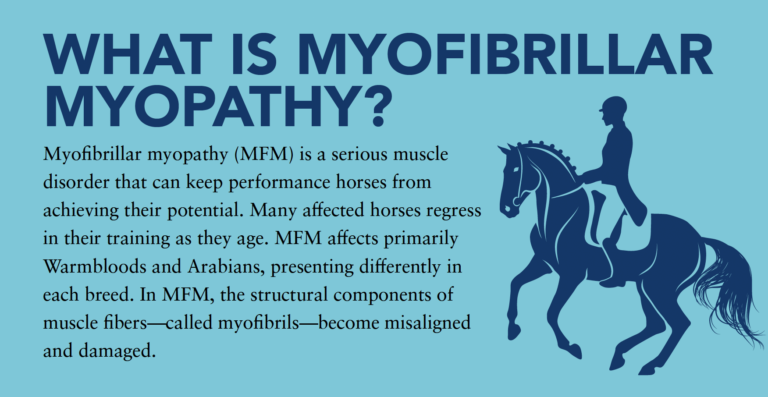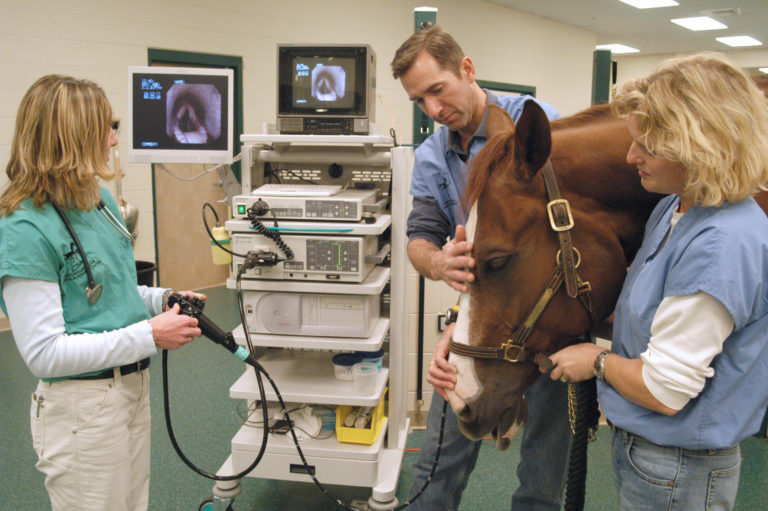Our dressage horses lead well-orchestrated lives. From the moment they arise in the morning to the moment they step into the arena, most have a routine that would be the envy of any human.
This careful management is calculated to produce the controlled power, beauty and precision of a winning test. But even the most ordered routines won’t necessarily prevent gastric ulcers, which occur more frequently in performance horses than you might realize. In fact, certain routines that are common in the dressage world can make our horses even more susceptible to ulcers.
Here’s a look at common symptoms and causes of equine gastric ulcers, as well as ways to treat and help prevent them.
Symptoms and Diagnosis
Simply put, a gastric ulcer is a lesion in the stomach lining. The majority of these develop in equines when excess acid from the lower stomach is forced into the upper part of the stomach, which is less suited to handling acid. The result is irritation and pain.
Horses that have trouble maintaining weight may well be nursing ulcers. Those who are naturally nervous (grinding their teeth, cribbing, weaving or stall-walking, for example) or experiencing unexplained weight loss are classic suspects, as well.
However, even the quietest souls and the easiest of keepers can be harboring ulcers. That’s because ulcers affect horses differently, depending on the severity of the case and the individual animal’s temperament and lifestyle. In many instances, the symptoms are vague enough to be mistakenly ascribed to other causes.
Has your sweet-tempered “schoolmaster” gelding been striking an uncharacteristic attitude, for example? Is your First-Level mare grumpy about girthing, suddenly pinning her ears, or displaying poor hair coat quality? All of these could be signs of hidden gastric trouble, as could lackluster performance, poor appetite or fussiness about feed. Chronic ulcers can even lead to intermittent bouts of colic. The bottom line: Your horse is uncomfortable and doesn’t know how to express it!
The only way to diagnose ulcers correctly is to have your veterinarian perform an endoscopy. Though “skipping the scope” and going straight to ulcer treatment might be cheaper in the short run, it’s important to find out whether the issue is actually ulcers. Gastric impaction and delayed gastric emptying are just two conditions with symptoms that might mimic those of ulcers but would require different treatments.
Causes
It has been estimated that between 70 and 90 percent of performance horses experience ulcers at some point during their careers. Just like in humans, the usual culprit is stress, to which the competitive dressage horse is certainly no stranger.
Disruption of routine, which occurs with travel to events and a frequent change in environment, is one obvious stressor. But there are other factors that could be at fault, too, including diet, lack of exercise, illness, and training or competing on an empty stomach.
You’ve no doubt heard it before: Horses are designed to graze 24/7, taking in small amounts of forage continuously rather than in several big grain or pelleted meals with a few flakes of hay daily. Though a stabled horse will stop eating when his hay rack is empty, his stomach continues to secrete acid in anticipation of more food—and before you know it, hello, ulcers!
Saliva helps neutralize stomach acids, but a horse who is not eating continuously is obviously not producing saliva. And here’s the thing: A horse produces less saliva when chewing grain than when chewing forage. In addition, the starch in grain meals can ferment, leading to the creation of volatile fatty acids that are also acidic. Therefore, frequent access to forage is ideal when looking to prevent diet-related ulcers. (Alfalfa in particular is high in calcium and protein, which help buffer stomach acids, as well.)
Then there’s the matter of exercise. Horses are built for continuous, low-level exercise like they get out in the pasture. Pressure-cooker training sessions can lead to stress, as can exercise on an empty stomach. At the other end of the spectrum, insufficient exercise or turnout can also lead to ulcers. (Ever seen a fit horse climbing its stall walls?) Many competitive dressage horses don’t spend much time in turnout; after all, no one wants to risk injury to these valuable animals. Unfortunately, being hand-grazed, put on a walker/treadmill or being turned out in small, individual paddocks isn’t always enough.
Unrelated illnesses or conditions can lead to ulcers, especially if they’re painful (which can lead to stress). Even common medications like phenylbutazone (bute) can put your horse at risk for gastric distress. In addition, consider herd dynamics: If your horse feels threatened by a paddock mate or misses a favorite who’s out of his sight, this, too, can result in stress. Even a bully one stall over can be a worry.
Prevention
To help buffer stomach acids, switch your horse to a diet that is based more in fiber and fats than carbohydrates and starches (ideally, a horse should get twice as much energy from roughage than from concentrates. Think quality hay and fat supplements vs. corn and other grains). Then do everything you can to keep him eating nearly continuously, whether you turn him out more, divide his concentrates into a number of smaller meals, or use a slow-feeder device for his hay. And always ensure his belly isn’t completely empty when you ride or compete him.
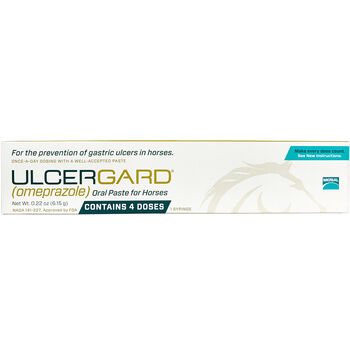
While on the subject of your horse’s overall health, make sure he is dewormed regularly and that his teeth are checked periodically, too. Go easy on meds with known gastric side effects, and keep your horse’s feeding and turnout routines consistent. And in case he doesn’t remind you himself: Position his buddies nearby whenever possible!
Whether at home or out competing, give your horse whenever possible the chance to stretch his legs, release pent-up energy and just plain chill out. When you’re on the road, bring his favorite treats, water from home or his favorite stall toys to encourage relaxation and help tame his tummy. A longe line and portable paddock are also handy if turnout will not be available.
If your dressage horse is in regular competition or undergoing any kind of stress (like travel, training, or stall confinement), you might also try a supplement designed to buffer stomach acids. Those with calcium and magnesium can raise the stomach pH to make it less acidic. A good omeprazole paste administered daily is another extra bit of insurance against ulcers that is handy to have when traveling.
Treatment
If, in spite of your efforts, your horse is diagnosed with ulcers, follow your veterinarian’s advice closely. If said horse isn’t in active training or competition, a bit of detective work might be necessary to determine the source of the problem, whether it be another stressor, his diet or what-have-you. Removing the source is the obvious next step.
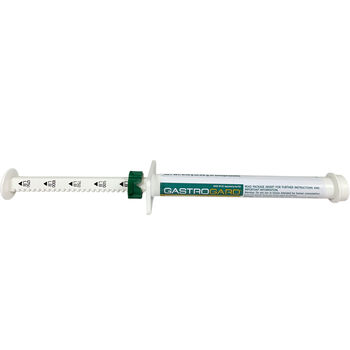
If clinical signs of ulcers persist and/or the source of stress cannot be removed, your vet might prescribe a medication targeted to decrease the production of stomach acid. Though the prescription medication might contain omeprazole, as do some preventive supplements, this medication should be designed for a horse that has actually been diagnosed with ulcers. So be sure to consult your veterinarian and read all labels.
Preserving equine digestive health is an important part of horse ownership. When all is said and done, a little knowledge, research and observation go a long way toward keeping our dressage partners happy and ulcer-free.


